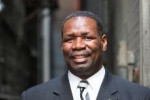
A teacher once told Patrick Patrong he would never amount to anything. That moment marked the beginning of his long-running dissatisfaction with traditional academia.But an impromptu juggling act at a conference breakfast table more than 20 years later convinced him there were other, more effective ways to learn. Today, with two degrees and a successful consulting business, Patrong is inspiring learners of all ages to excel.
“After several different career spins and some private consulting, I realized that equipping employees with the tools needed to achieve success in their organization was where my desire was,” says the resident of Richmond, Virginia.
Patrong is currently director of Workforce Planning and Development in the Department of Social Services for Richmond, Virginia. There, he holds program oversight and is lead facilitator for the Leadership Academy for Emerging Leaders and the Local Directors Learning Experience.
Since 2009, he has also been a faculty member with the University of Phoenix’s College of Humanities. Patrong is known for creating magical experiences both in and outside the classroom.
He believes that establishing a positive learning environment that is naturally interactive makes the learning experience fun so that learners and facilitators alike desire to be there.
He brings this experience to the classroom at the University of Phoenix, where he enjoys the freedom offered to facilitators.
“At the University you are taught the process for consistency in learning, however, you are allowed the freedom to be as creative in your delivery as needed for the learners. Your experience and unique characteristics are not checked-in at the door, but are used to enhance the learning experiences for all those involved,” says Patrong.
A native of Trinidad & Tobago, Patrong admits he was a lackluster student often reprimanded for goofing off in class. But the very thing that got him in trouble would become the cornerstone for his consulting business, motivational presentations and Magic With A Message.
“I was presenting at a youth conference and I picked up some oranges and started juggling them,” he recalls. The move was so well received by the audience that he added juggling and magic tricks to his future presentations. Right where the audience is expecting that magical moment to take place, their minds are so open to knowledge intake,” explains Patrong. “A story told along with the magic has a lasting impression.”
While magic spurred on his motivational presentations, basketball played a role in Patrong’s early academic life. Playing for Trinidad & Tobago’s national team, he landed a basketball scholarship to Grambling State University in Louisiana where he earned a Design Engineering Degree. He later earned his Master’s Degree in City and Regional Planning from Morgan State University in Baltimore.
Currently facilitating Foundations for General Education and Professional Success, a course in the College of Humanities, Patrong is based out of the University’s Richmond Campus.
An ordained Minister of the Baptist Church, he tells his students that life is an opportunity for learning and he challenges them to apply their weekly class lessons to everyday life.
“I ask them not to just see the world as it is, but to constantly evaluate and anticipate what is needed. In an organization, the person of value is not the one able to respond in a time of crisis but the one who can prevent the crisis,” he said.
Patrong can often be found giving back to his community. He has served as Legislative Chair for the Independent Living Association’s board of directors, was a board member for Big Brothers and Big Sisters of Maryland, and was committee chair for the National Foster Care Awareness Project.
Patrong was also one of the primary writers on the Foster Care Independence Act of 1999. This federal legislation grants $140 million annually to foster care programs around the U.S. in support of foster care teens exiting the system.
Patrong is also continuing in his pursuit of his lifelong dream: becoming Prime Minister of Trinidad & Tobago. “I have strategically taken positions in my career not based on salary but based on opportunities to learn and add to my proverbial backpack,” he says.
He wants to bring his wealth of experience to help the youth of his home country succeed. He believes that acquiring skills in the areas of education, recreation, inspiration and occupation will be critical in the success of youth transitioning into adulthood.
“Throughout my career, I’ve always avoided the academic world,” says Patrong. “I consider myself a life learner, but in my roles in Human Resources and Organizational Development I recognized that traditional universities weren’t meeting the needs of working learners.”
He enjoys the non-traditional approach at University of Phoenix, where the focus is on educators who are practitioners. “It’s a concept that really makes sense,” he explains. “I’ve found that I gain as much inspiration from my students-I call them my learning partners-as they do from me.
